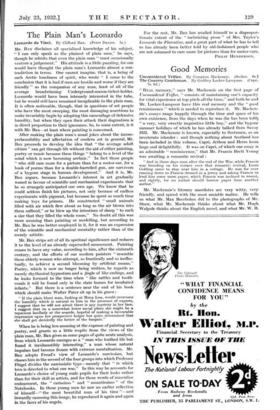The Plain Man ' s Leonardo Leonardo da Vinci. By Clifford Bax.
(Peter Davies. 5s.) MR. BAX disclaims all specialized knowledge of his subject. "I can only speak as the plainest of plain men," he says,
though he admits that even the plain man "must occasionally venture a judgement." His attitude is a little puzzling, for one would have thought the plain man's Leonardo almost a con- tradiction in terms. One cannot imagine, that is, a being of such Arctic loneliness of spirit, who wrote " I come to the conclusion that it is bad if men are hostile and worse if they are friendly" as the companion of any man, least of all of the average breadwinning Underground-season-ticket-holder.
Leonardo would have been intensely interested in the tube, but he would still have remained inexplicable to the plain man.
It is often noticeable, though, that in questions of art people who have the most sweeping, the most damaging assertions to make invariably begin by adopting this camouflage of defensive humility, but when they open their attack their dogmatism is in direct proportion to their ignorance. So, to some extent, is it with Mr. Bax—at least where painting is concerned.
After making the plain man's usual jokes about the incom- prehensibility and affectation of modern art in general, Mr.
Bax proceeds to develop the idea that "the average adult citizen " can get through life without the aid of either painting, poetry or music because these things "belong to a level of the mind which is now becoming archaic." In fact those people "who still care more for a picture than for a motor-car, for a book of poems than for a double-barrelled gun, are survivors of a bygone stage in human development." And it is, Mr. Bax argues, because Leonardo's interest in art gradually waned in favour of scientific and mechanical experiments that he so strangely anticipated our own age. We know that he could seldom finish his pictures, not only because of endless experiments with pigment, but because he spent so much time making toys for princes. He constructed "small animals filled with air which flew about as long as the air blown into them sufficed," or he blew up the intestines of sheep "to such a size that they filled the whole room." No doubt all this was more amusing than painting or modelling, but according to Mr. Bax he was better employed in it, for it was an expression of the scientific and mechanical mentality rather than of the merely artistic.
Mr. Bax strips art of all its spiritual significance and reduces it to the level of an already superseded amusement. Painting ceases to have any value, according to him, after the sixteenth century, and the efforts of our modern painters "resemble those elderly women who attempt, so frantically and so ineffec- tually, to achieve a second blooming by artificial means." Poetry, which is now no longer being written, he regards as merely rhythmical hypnotism and a jingle of like endings, and he looks forward to the time when "like rattles and tooth- corals it will be found only in the state homes for incubated infants." But there is a sentence near the end of his book which should make Walter Pater sit up in his grave :
" If the plain blunt man, looking at Mona Lisa, would overcome the humility which is natural to him in the presence of experts, I suggest that he will not admit there is any mystery in her face. I suggest that on a somewhat lower social plane she might be a, rapacious landlady at the seaside, hopeful of making a favourable impression upon her prospective lodger but quite determined that she shall get decidedly the better of the bargain."
When he is being less amusing at the expense of painting and poetry, and grants us a little respite from the views of the plain man, Mr. Bax gives us some pages of quite acute analysis, from which Leonardo emerges as a "man who loathed life but found it inexhaustibly interesting," a man whose natural impulses had become frozen with extreme mentalization. Mr. Bax adopts Freud's view of Leonardo's narcissism, but classes him in the second of the four groups into which Professor Fliigel divides the narcissistic type—namely that "in which love is directed to what one was." In this way he accounts for Leonardo's choice of young male pupils for their looks rather than for their skill as artists, and for those words of masculine endearment, the " carissimo " and " amantissimo " of the Notebooks. In those young men he saw an earlier reflection of himself—" the most beautiful man of his time "—and inwardly caressing this image, he reproduced it again and again
in the faces of his angels. For the rest, Mr. Bax has availed himself to a dispropor- tionate extent of the "inebriating prose" of Mrs. Taylor's Leonardo the Florentine, and a great part of what he has to tell us has already been better told by old-fashioned people who are not ashamed to care more for pictures than for motor-cars.
PHILIP HENDERSON.














































 Previous page
Previous page